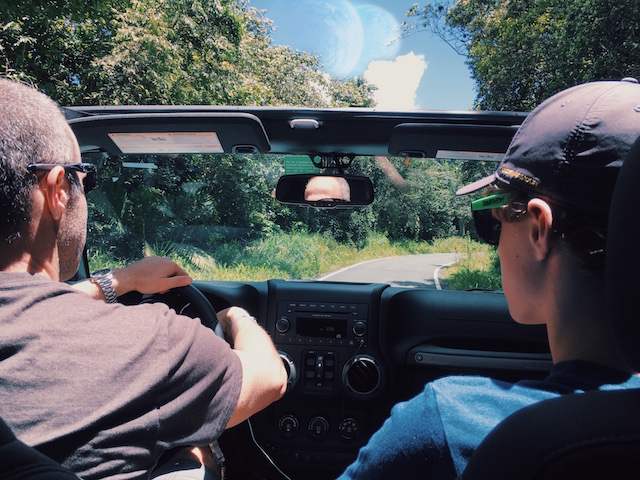
Lessons from A Seven-Year-Old Boy and His Yellow School Bus.
One cloudy winter morning, I had a conversation with a few of my colleagues about anxiety—more specifically, anxiety involuntarily inflicted upon children by their parents.
As mental health employees—psychologists, social workers, counselors—we get to meet a lot of people with a lot to say. We talked about how parents can unknowingly and unintentionally produce or increase anxiety in their kids instead of trying to help them deal with it.
It was an interesting discussion that left me wondering whether I do this with my own kids. The answer came to me faster than I could have imagined. It came in the form of a direct experience, which I’ve always believed to be one of the best ways to learn anything.
The following morning, while trying to get my three kids ready for school, I thought I had things under control. I was flying solo because my wife was out of town on a trip with one of her friends. My morning routine without the extra pair of adult hands to help meant there was quite a bit to do: preparing breakfast for the three of them, making sure they all ate, getting them dressed, packing their school bags, and, for my eldest, making sure he was ready in time to catch the bus.
All of this was stressful, and I can admit I was feeling a bit anxious—anxious about checking all the boxes throughout the morning from the moment the kids woke up until the youngest was dropped off at daycare.
Normally, the easiest part of this routine is making sure my eldest son is waiting at the bus stop. He’s a pretty independent and autonomous kid, so I know that I can count on him to go easy on me.
Not that day.
It so happened that this specific day, my independent son decided to play with his baby brother instead of putting on his coat, shoes, and hat. He chose to ignore, on several occasions, my directions for him to get ready.
So a few minutes later, when we heard the bus coming, we rushed out the door, and he ran across our driveway dragging his backpack.
But it was too late. He had missed the big yellow bus. This was new for both of us. It was the first time he had missed it since he started taking it to school.
My reaction? I was furious, and I didn’t even know why. How dare he do that to me, and to the rest of the family?
Rushing thoughts (in hindsight, rushing with emotion) came to my mind as if catching that big yellow bus had been the most important part of our day. Now I had to hurry my other two children, change them, make them chow down their food, and get them ready in a very short period so I could drive my son to school.
So we did. In a few minutes, everyone was in the car, and I was driving my seven-year-old to his school.
Then, reality hit me. Did I overreact? Why was I so affected by this? Yes, it got me out of my planned schedule, but was it really that important?
I then started listening to my son, staring at him through the rearview mirror. He looked terrified. He was nervous and started thinking of ways we could catch the bus although it was already gone. He started telling me how if we got to school, he would have to wait until everyone got out of the buses so he could go in.
It was his anxiety talking. It really touched my heart seeing him like that, and I felt terrible. I felt guilty for all of it. I had blown the whole situation out of proportion—way out of proportion! My reaction was exaggerated.
I transferred my own anxiety to my young son.
While we were driving, I became aware of all of this and started trying to shift his mindset of the situation—and mine at the same time.
I assured him that everything was going to be fine and that even though this was new for both of us, we would find what needed to be done together. I explained to him the importance of listening to directions (but not just following them blindly), but also the importance of him seeing that there are consequences to our actions.
I then assumed responsibility for what happened—at least the parts that belonged to me—and told him that I had overreacted, that he was going to be in school on time, and that we would learn the procedure for when students don’t take the bus to school. I asked him not to worry about this anymore.
We made it on time. Together, we figured out what the process was for students who don’t take the bus, and I stayed with him until it was time for him to go to class. He looked relieved when he finally went to school. Later that night, I talked to him again about what happened, and I highlighted the importance of not worrying about missing the bus.
That is my job as his father.
So, what did I learn (or remember)?
Children and Anxiety.
It is unfair to make a child be part of the “hectic” life we create in our adult heads, to draw them into our own emotions, and most importantly to transfer our anxiety to them. It is our responsibility as parents to manage the time, not theirs. It is their responsibility and privilege to be kids, to have fun and learn through playing. They shouldn’t be worrying much about this random way of measuring time through seconds, minutes, and hours.
Control vs. No Control.
This experience reminded me of something I tell my clients regularly: Focus on what you can control rather than what you can’t. Do what’s in your power and in your hands instead of allowing your head to wonder about all the things that you won’t be able to do, which, at the end of the day, only produces more anxiety.
Anger and masking emotions.
Oh, my old companion: anger. I adopted this as my go-to emotion at a young age; it’s the easiest one for me to go to. Although it is not pleasant at all, it is not as uncomfortable—at least for me—as some other emotions. It tends to disguise sadness, fear, disgust, and of course anxiety.
This experience with my son reminded me of how, if we are not aware of what is going on within ourselves, we tend to let autopilot take over and hijack our minds. We need to be mindful of ourselves and stay there, with whatever is going on (even or especially if it is uncomfortable) in order to deal with it in a healthy, productive way.
Consideration of others.
I learned that it is important to pass this value along to my children. All of our actions have reactions. My son’s distractedness had consequences for the rest of the family, and, although they weren’t serious, they affected his siblings and myself. But it wasn’t the end of the world, right?
Try finding opportunities to talk to them about other important topics that may arise to help them grow into compassionate people.
Find the lesson.
It is always interesting and meaningful to discover the lessons in our experiences. Try not to label them, compartmentalize them, or judge them. It’s not easy, and certainly, a lot of us struggle with this more than we wish.
Read what you write—or in other words, live what you preach.
Sometimes, I struggle to live what I am writing or talking about with a client or trying to inculcate to my children, as I’m sure most parents do. As parents, friends, professionals, it is always easier to give advice, suggest, encourage, than it is to apply it to our lives.
Awareness of our emotions and thoughts may be the biggest lesson here.
It is not fair to put on others what belong to us, especially those closest to us. The importance of mindfulness in the day-to-day was exposed during this situation. Although as parents (and people) we will inevitably fail from time to time to be fully present, the gaps of unawareness can get shorter, and our consciousness, bigger.
~
~
Author: José Briones
Image: Asaf R/Unsplash
Editor: Callie Rushton






Read 12 comments and reply